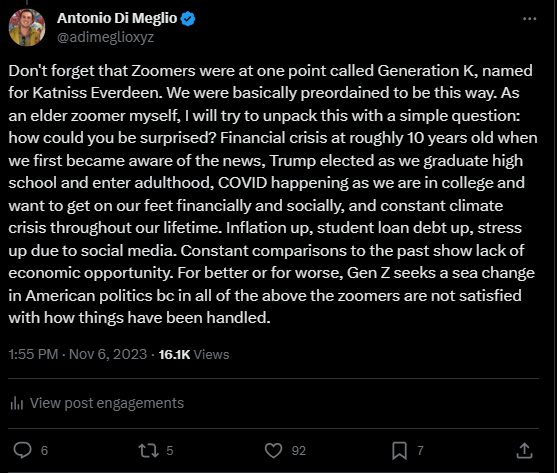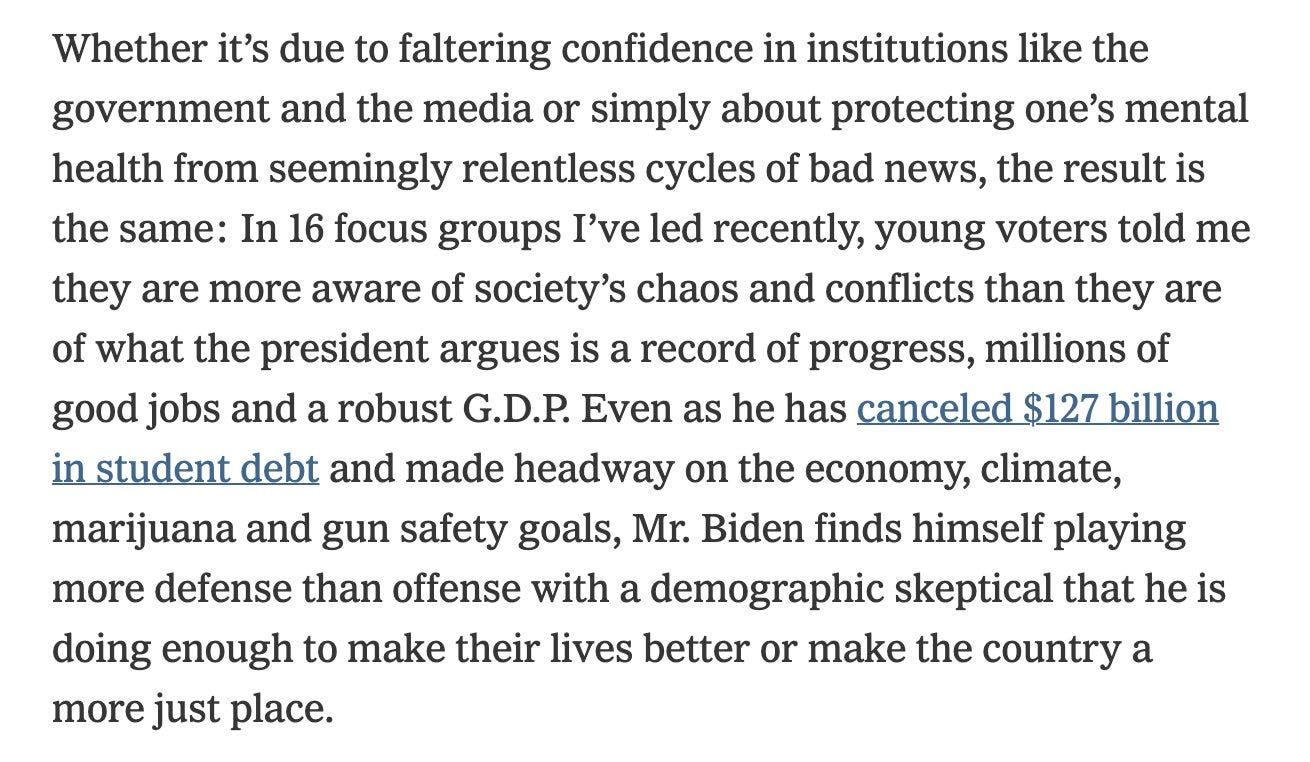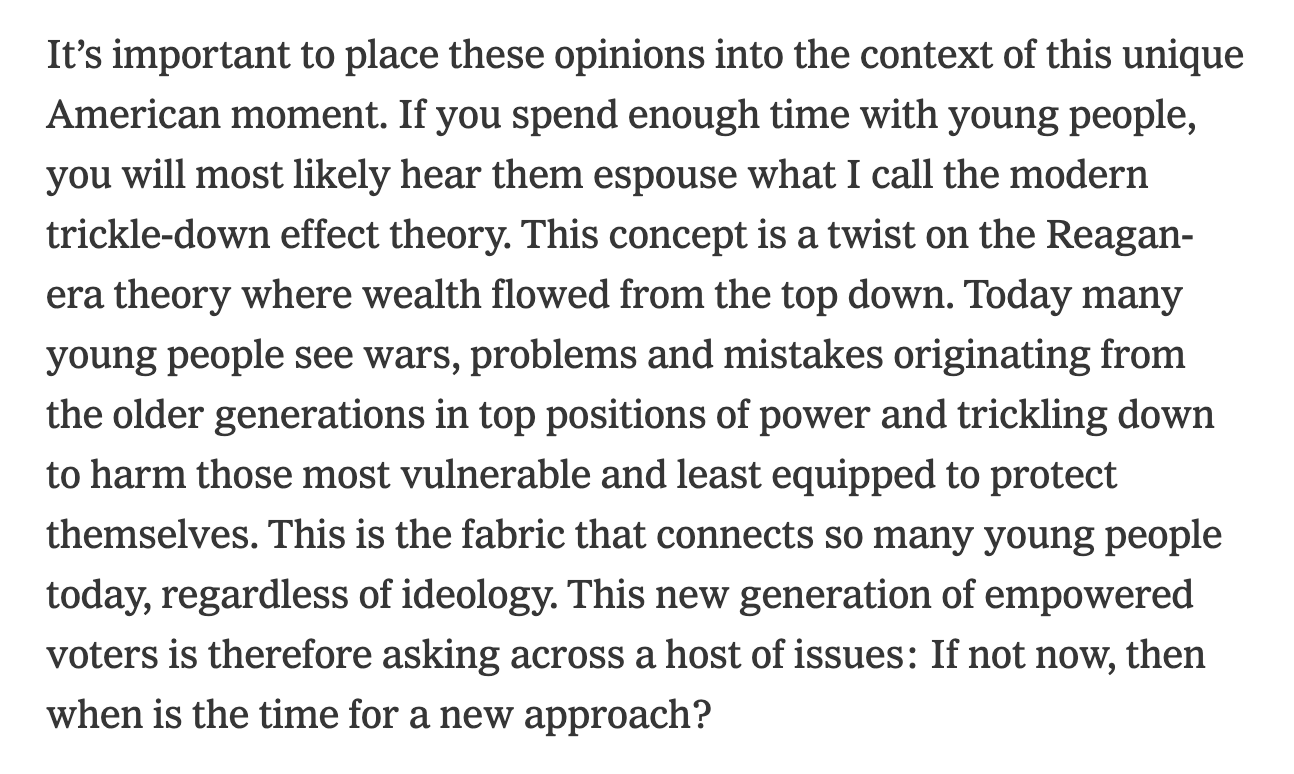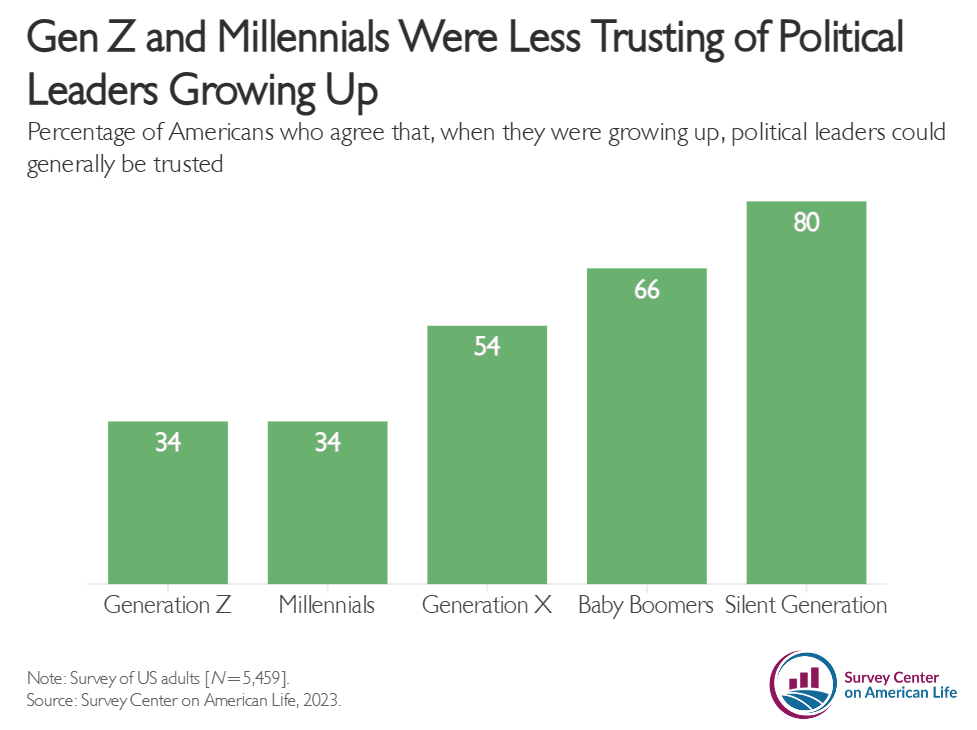Elaborating on Gen K
The national "trust insurance" policy has dissipated.
While sitting in my Center for Policy and Research office at my law school and waiting for my next class to begin, a typical school day became extraordinary when I laid my eyes on a certain tweet.
The tweet was from Jake Anbinder, a historian and Fellow at Cornell University according to his bio. Jake’s tweet stated: “The political nihilism of Gen Z is something that needs more unpacking.” To illustrate his point, he posted the following two screenshots.
Of course, this is not novel territory for twenty-somethings. The civil rights movements of the 60s and the anti-war efforts in the Vietnam era were largely led by young people. My main boss these days is Professor Mark Denbeaux, the longest-tenured Professor at my law school and someone who has a photo of him in his 20s at the March to Selma on his Wikipedia page. For generations, young people have been ready and willing to take action where they deem fit. Visit the National Center for Civil and Human Rights in Atlanta for great examples. Hell, even a dozen signers of the American Declaration of Independence were under 35.
So, I was confused as to why Jake thought that Gen Z specifically needed unpacking and decided to lay the generational grievances out for him on the famously unaggressive “X” dinner table below.

I wrote this post halfheartedly while sitting in my office with Professor Denbeaux. As someone who has experienced all of these as a conscious, free-thinking member of Gen Z, this was second nature to write.
The responses ranged from argumentative to comedic to agreeing. When someone facetiously replied with “hey do you know that Katniss Everdeen is a fictional character,” it forced me to re-examine my study of “Gen K,” a term that I first learned about in my research for my first Free Throws essay, “A generation that is anything but medium rare.”
In March 2016, Noreena Hertz wrote the following words about Gen Z (which she refers to as Gen K) in The Guardian:
“Like Katniss, they feel the world they inhabit is one of perpetual struggle - dystopian, unequal, and harsh.”
This is before Trump.
Before COVID.
Before TikTok.
It’s as if we were preordained to be this way.
Hertz’s article includes statistics that indicate an imminent decay of cultural, mental, and financial health for Gen Z. “When asked whether they think their lives are likely to be more of a struggle than those of their parents’, their answer is an unambiguous yes: 79% worry about getting a job while 72% worry about debt – and not only student loans.”
Flash forward to today. The American Survey Center released poll results last week on “Generation Z and the Transformation of American Adolescence.” This study noted that 60% of Gen Z adults “say they worry at least sometimes about having enough money to pay their bills.” Furthermore, “three-quarters (75 percent) of Gen Z women and about two-thirds (66 percent) of Gen Z men say they worry at least once in a while about whether they will be able to attain a meaningful job or career.”
If strives have been made in the economic and cultural arenas, as noted in the above screenshots shared in Jake’s tweet, why have these worries not meaningfully changed in over seven years?
The answer, of course, is complicated. But Gen Z’s collective feeling towards one element of day-to-day life sticks out to me: trust.
The graph below struck me the most out of all the American Survey Center’s published findings.
America today is seemingly experiencing a crisis of trust. Even if someone had an answer to these incredibly complex issues, the concept of who or what would execute a multipronged plan successfully is unclear.
Historically, the federal government has provided what I will coin a “trust insurance” policy to the American people. Even if there were problems in day-to-day life, the concept existed that because you were an American, the social safety net of the American dream would catch your financial and societal struggles.
As noted above, this feeling was felt by young members of the Silent Generation and Baby Boomers. However, this notion has completely dissipated for Gen Z.
My purpose in responding to Jake’s tweet and writing this article today is simple. I want to show that, quite frankly, the reasons behind Gen Z’s lack of trust and the ongoing “vibecession” should not be a mystery.
(Vibecession is a term coined by economist Kyla Scanlon to describe a period when popular sentiment - i.e., vibes - is skewing negatively despite an economic environment showing signs of progress.)
If you’re not Gen Z and you are reading this, I would like to ask you the following questions:
What if you grew up in a time when your popularity could be measured on an app that everyone could see?
What if you got your high school or college experience cut off by a global event you could not remotely control?
What if traditional ladders to economic progress like higher education and owning a home became historically out of reach during your young adulthood?
Whether Gen Z’s perception of a lack of faith in the government or other public institutions is justified is a different question. Perhaps one could argue that the federal government’s response to the COVID crisis has been enormously successful and that the liberal achievements of the Biden administration should outweigh all of the drawbacks of the Trump administration.
I will not argue for or against either of those. If either of those arguments is correct, though, the messaging to young people needs to improve.
It has already become clear that the next presidential election will follow the trend of being another “historic” and “unprecedented” moment in our lives. I personally feel as if there is a lack of media attention on the US election currently. With third-party candidates emerging and President Trump’s legal status in question, anything is possible. There is absolutely no doubt in my mind, though, that President Biden’s chances of re-election rely on the broad support from the Gen Z democratic base that carried him to victory in 2020.
The New York Times-Siena poll of 3,662 registered voters in six battleground states that was released last week had an insane result for Gen Z that should alarm all of us: the popular choice for President for those aged 18-29 is not Trump (29%), and not Biden (30%), but rather the independent Robert F. Kennedy, Jr. (34%).
This should scare the crap out of both leading parties. But once again, given what I said in my tweet, I am unsurprised.
Just like Katniss, “Gen K” is not afraid to eat the proverbial poison berry in the hope that the change they seek will ensue. But we can only hope that the change that comes is change for the better instead of blind retribution.
As Katniss said in the first Hunger Games novel: “You don’t forget the face of your last hope.”
Gen Z, like Katniss, yearns desperately to hope for something. But before hope is earned, so must trust.
A new Hunger Games movie is coming out this week, and I promise that this did not influence the timing of this article. But I do look forward to reading the book and watching the movie.





